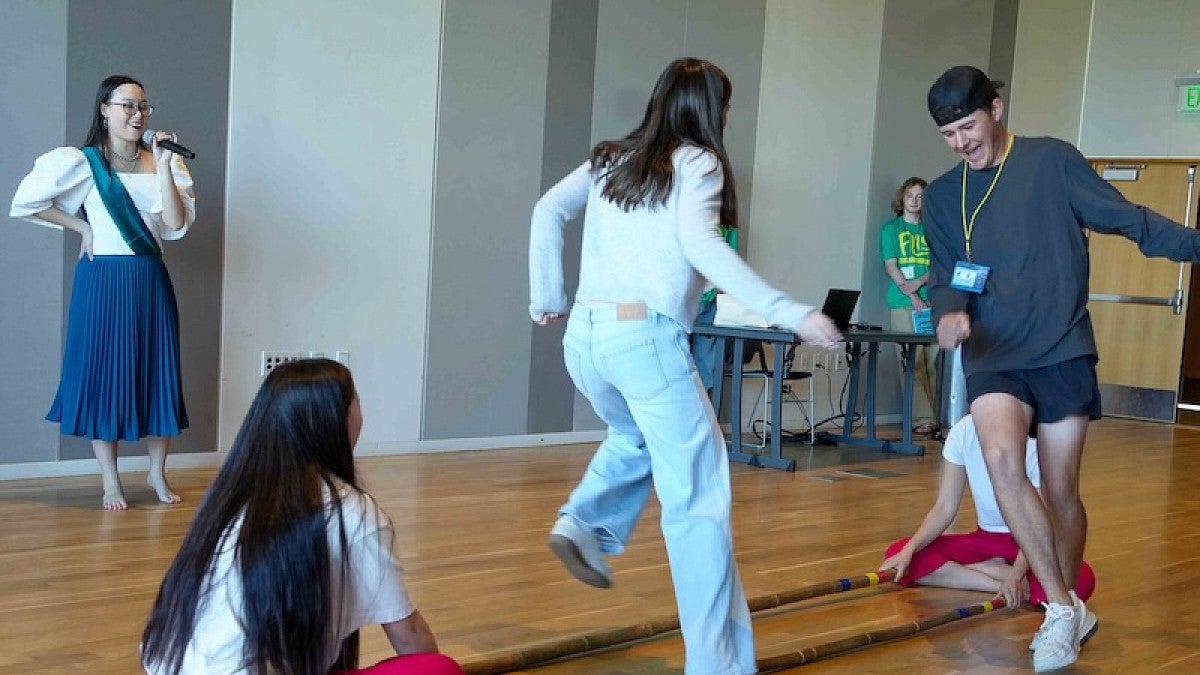
Learning about and engaging in the world got a little easier for students at University of Oregon thanks to a grant from the US Department of Education awarded to the Schnitzer School of Global Studies and Languages. The grant funds are being used to strengthen curriculum for current students in the Schnitzer School and attract the next generation of globally minded students from Oregon high schools.
“So many high school and college students in Oregon will benefit from this grant, which is introducing to them the power of learning about the world and the enriching endeavor of learning a language,” said Yvonne Braun, professor of global studies and one of the grant proposal writers. “We hope this money can allow us to build exciting new programs and courses to inspire the next generation of students to come to the school, study global issues and cultures while learning languages and make a real difference in the world.”
In addition to Braun, the grant’s proposal team includes Schnitzer School Executive Director Aneesh Aneesh and German and Scandinavian Professor Matthias Vogel.
—Aneesh Aneesh, Executive Director of Schnitzer School of Global Studies and Languages
The grant was initially awarded two-year funding, but the second year of funding — $149,580 — was recently retracted by the Department of Education, amidst larger cuts to education programs by the federal government. First-year funds are still available to support the school, contribute to outreach programs to Oregon high schools and improve the educational experience of current and future University of Oregon students.
One community outreach program this funding supports is the popular Foreign Language and International Studies Day (FLIS) organized by the Yamada Language Center in the Schnitzer School. The event brings over 1,000 high school students and teachers to the UO Eugene campus. Faculty members from across the Schnitzer School present topics related to their expertise, such as Chinese calligraphy, Bhangra dancing, shared vocabulary in Arabic and Spanish — and more.
Additionally, the grant supported a weeklong summer program on world cultures for Oregon participants in SAIL (Student Academy to Inspire Learning). Those who participate in SAIL are high school junior and rising senior students who are considered low income, underrepresented and/or first-generation students. The program is a pre-college immersive experience on the UO Eugene campus designed to encourage students to pursue, enroll and succeed in higher education. Grant funds helped purchase materials, develop engaging curricula, and hire student workers to support the SAIL program and participants.
For current and future UO students in the Schnitzer School, federal funding will support new curricular opportunities including courses and programs focused on diverse areas such as human rights, environmental humanities, international relations, and language and communication. The school is also integrating internships and other experiential learning opportunities to improve graduation rates and help graduates find careers after college.
“This grant strengthens our Oregon connection — FLIS and SAIL — so more first-gen and underrepresented students can see themselves in globally focused majors and finish on time,” Aneesh said. “It also advances our integrative model, which links international studies, area studies and languages while accelerating several new, career-legible programs that meet student demand.”
Grants like this from the Department of Education bolster the transformational $25 million gift from the Jordan Schnitzer and the Harold and Arlene Schnitzer CARE Foundation.
“Support like this affirms a shared vision for the Schnitzer School: a streamlined curriculum where students choose a substantive field, a world region, and a language — three straightforward selections that allow double-majoring or minoring without adding time to degree,” Aneesh said. “That means better advising, faster progress and earlier entry into meaningful work."
—By Henry Houston, College of Arts and Sciences
